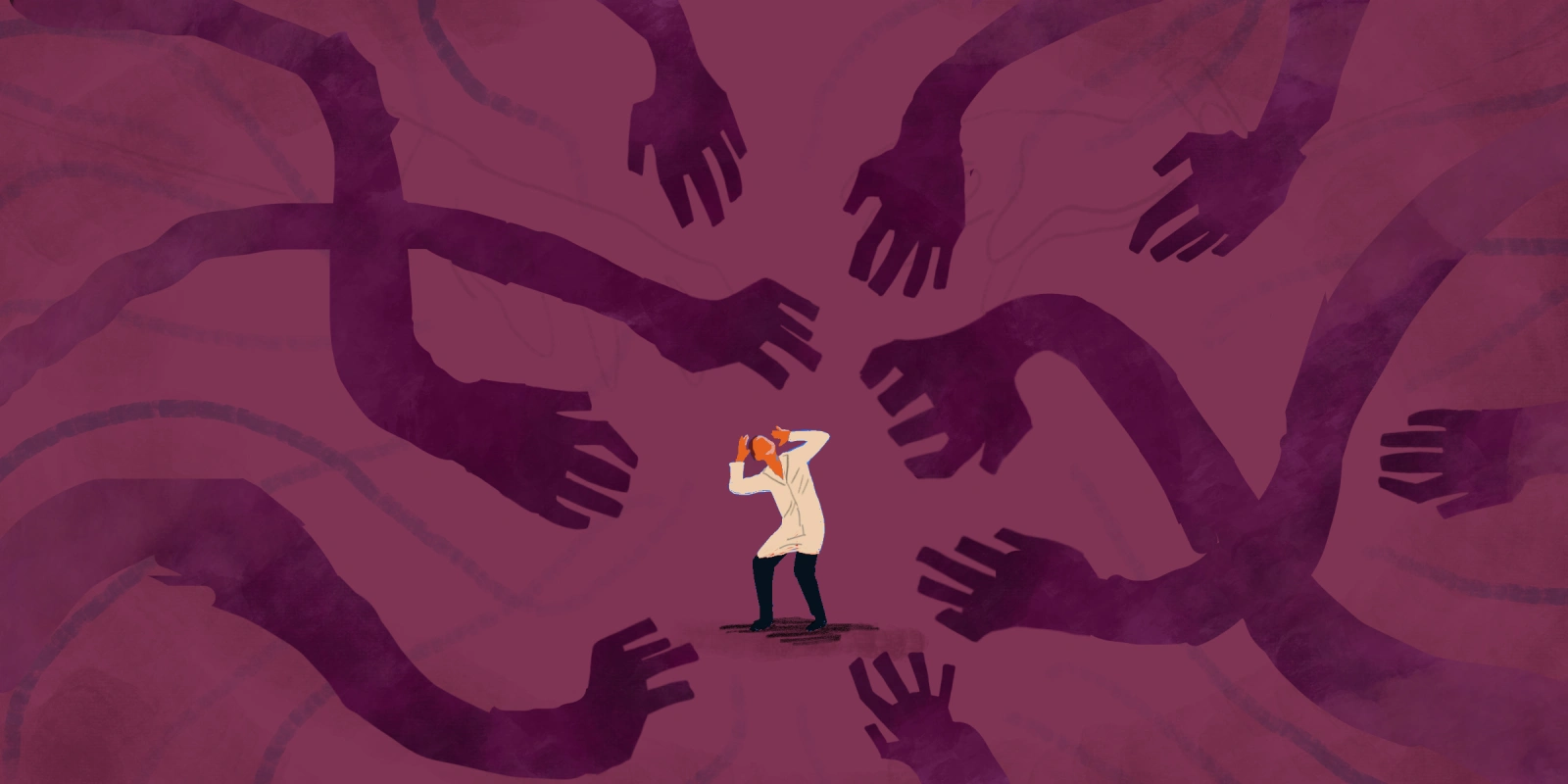A few years ago, I was working a triage shift in the ED. The role for the physician on this shift is fluid, but the primary purpose is to help streamline downstream clinical care and essentially “move the meat” faster through the department. The big wigs would reframe this as providing timely and efficient, quality medical care. I read EKGs in real time, hot off the patient press. I answer patient callback questions, make decisions about culture results, and accept patient transfer requests from other hospitals and clinics. I review the patients’ triage complaints and vital signs, ordering labs that can be drawn or imaging that can be performed while the patient sits in the waiting room. Finally, if a patient’s complaint is “easy,” – read, not an emergency – I can do the whole patient encounter from the waiting room. This makes sense for things like suture removals or evaluating a sprained ankle. However, the system takes this a step further and uses the triage role to “decompress the lobby” with far fewer of the resources and less time than I would normally have in the main ED.
Fully entrenched in the above distracted and pressured tasks, the triage nurse asked me to discharge a man with a one-month history of dental pain. I briefly checked his chart and saw a red safety flag for prior violence in the ED. I quickly opened the two most recent flags entered from a year prior and noted the patient had not been violent during those visits. He had a past medical history significant for bipolar disorder, but no other serious medical conditions. I checked his documented vitals: normal. I stood up and called his name. He stood up and walked toward me. I introduced myself, “Hi, I’m Dr. Jones, I’ll be taking care of you today,” and I indicated for him to follow me. He responded with a suspiciously over-enthusiastic “that’s great” as I felt his eyes size me up, toe-to-top. Was my introduction misleadingly sexual? The patient was a young man, and he towered above me, twice my size. I turned and walked toward a private triage room. I felt his eyes burning through me, but I had no objective confirmation of that, it was just a feeling. I checked my bias and tried to suspend my judgment, internally chastising myself. I should give him the benefit of the doubt.
We entered the triage room. There was one chair, I had him sit. “What brings you to the ED today?” He detailed his dental pain, pointing to the back lower right part of his mouth. It had been ongoing for a month, and he couldn’t find a dentist, an exceedingly common problem. No trauma. No fever. No abscess. I pulled the overhead light to shine in his mouth and asked him if I could take a look. I saw his cavity and the absence of any emergent cause of his pain. I stepped back. “Is there anything else I need to know?” I launched into my standard review of systems to make sure I wasn’t missing anything. My practice is to ask in order, from top to bottom: No trouble swallowing, no chest pain, no shortness of breath, no belly pain, no problems urinating or stooling. While I do not feel comfortable publishing the details of his subsequent actions, suffice it to say, I now intellectually recognize it to be sexual assault. I also know that a large portion of our population would dismiss it as “boys will be boys.” While this event far exceeded the lewd comments, gestures, and grabs I suffered as a server and bartender in my 20s, in that moment, I was dumbfounded and partially paralyzed by my surprise, completely uncertain of what to do.
I told the patient I was discharging him and opened the door. He asked me for a Band-Aid. I looked down the hall and saw a male nurse, should I ask him to get the Band-Aid? The nurse was busy, and I feel elitist asking nurses for mundane things I am quite capable of doing. I returned to the room and offered the patient the Band-Aid. He asked me to put it on for him. Do I say no and risk escalating the situation? I put Band-Aids on people all the time. I’m a doctor. I dress wounds. I handed him the Band-Aid. He asked for a prescription for ibuprofen, clarifying that he needs the prescription dose. There is no difference between prescribed and OTC ibuprofen, but this is a battle I have never had the energy to fight, and I wanted out of that room. “Sure, I can send a script to your pharmacy.” He asked, “Can I have something to eat?” “Sure, I will have the nurse bring you a snack, in the waiting room, while I write your discharge papers.” I stepped out of the room and went back to my perch.
I felt shaken, blind-sided, and dirty. Was that just normal patient care or was I sexually harassed? Did he plan this? Was it an opportunistic event? Someone handed me an EKG. I answered a call to accept a transfer. I wrote a nursing message for snack delivery and discharge. Another EKG. I wrote discharge instructions and clicked the green button that makes the patients go home. EKG, no STEMI. I texted a friend what happened, and she asked if I called security or the police. Should I report it? The patient was discharged and there was no imminent physical danger to me or anyone else. He was calmly eating his snack in the middle of the lobby. If I didn’t tell the patient his behavior was inappropriate in real time, how could I call the police? This didn’t seem worthy of pressing charges. I am physically OK.
Because physicians can’t flag charts, I walked to the opposite end of the ED to ask a social worker to flag his chart with a brief description of what happened. She wrote it down on a scrap of paper and said she would do it later. Would she? I tried to objectively document what happened in the patient’s chart, cognizant that he would have access to it. I can’t blind a patient from their own chart unless it could cause them harm to read it. What about my harm? What about the potential harm to a future physician who enters a room with this patient alone, thinking she is going to evaluate dental pain?
I see myself victim-blaming. How should I have responded to this patient’s inappropriate behavior? Why did I let this happen? I definitely shouldn’t have gone back into the room alone. I thought about emailing the administration, but I couldn’t bear the thought of being told how I should have reacted. Or being told how to react the next time this kind of thing happens. While I felt violated, I could see an interpretation of the sequence of events as normal patient care. Was this sexual assault? The onus is on me to prove it. He did not rape me; he did not inflict a physical injury. No one cares unless it is rape, and even then, they only sometimes care. That is what I have learned by living as a woman in our society.
ED violence is a hot topic in EM right now. Physicians are harmed in many unique ways at our place of employment. We care for patients during the worst moments in their lives. We understand that a patient’s crazy behavior may be a reaction to an exceptional circumstance in their life. We accept abuse from older demented people, intoxicated people, psychotic people, and terrified children. We acknowledge that patients may be altered, or frightened and acting out. We tolerate abuse and pride ourselves on reacting with calm compassion. Yet we are not empowered to protect ourselves. If a patient screams hateful, misogynistic, or racist comments at us or threatens us, we are expected to acknowledge their frustration and attempt to form an alliance with them so that we may provide them with the best medical care.
Patients assault health care workers in the ED regularly, yet we rarely involve the police or press charges. We move on, accepting that this is just a part of the job. Thankfully, more research is being done in this area, and some legislation is even being introduced to protect health care workers, but I fear much of the focus is on weapons and physical violence. When we talk about sexual harassment, it’s usually in the form of a mandatory workplace human resources video from the ’80s about how not to harass colleagues. No one teaches us how to respond to patient harassment.
For months, when I closed my eyes at night to sleep, I relived that patient encounter. I know many health care workers who have experienced far worse treatment from patients. I have been minimizing my experience by comparing it to what has happened to my colleagues, what could have happened to me, and how much worse it could have been. But if we dismiss the things deemed not egregious enough, then we will forever be raising our tolerance level for abuse and we will never achieve a safe working environment. I signed up to be an emergency physician for the fulfillment of caring for the marginalized and disadvantaged people in our society. I did not sign up to be sexually assaulted as part of my job.
How do you handle inappropriate patient experiences? Share in the comments.
Dr. Jenny Jones is a global emergency physician in Massachusetts. She enjoys dancing, aerial arts, and drawing silly anecdotal cartoons. She was a 2023–2024 Doximity Op-Med Fellow.
Illustration by Diana Connolly







